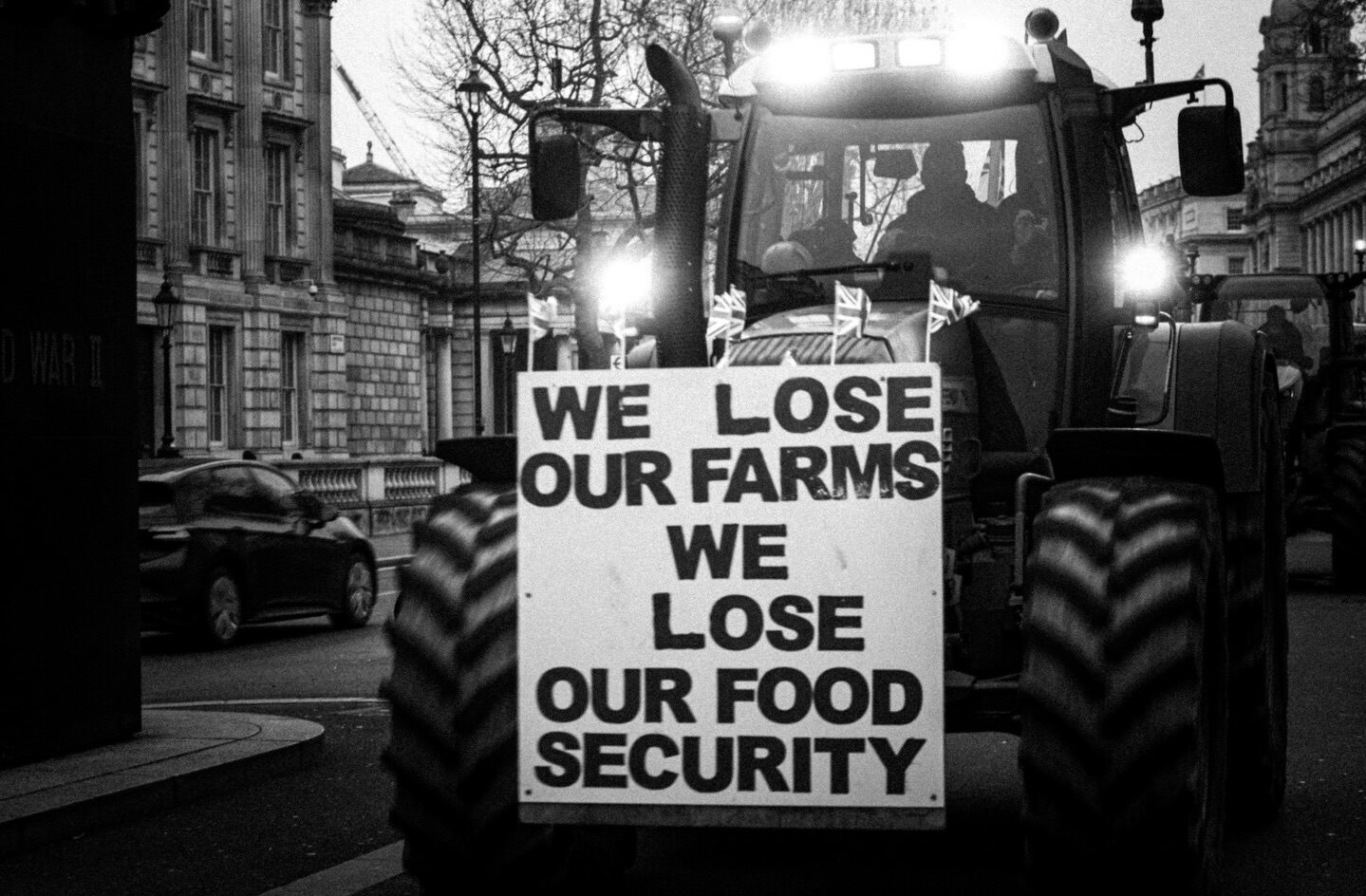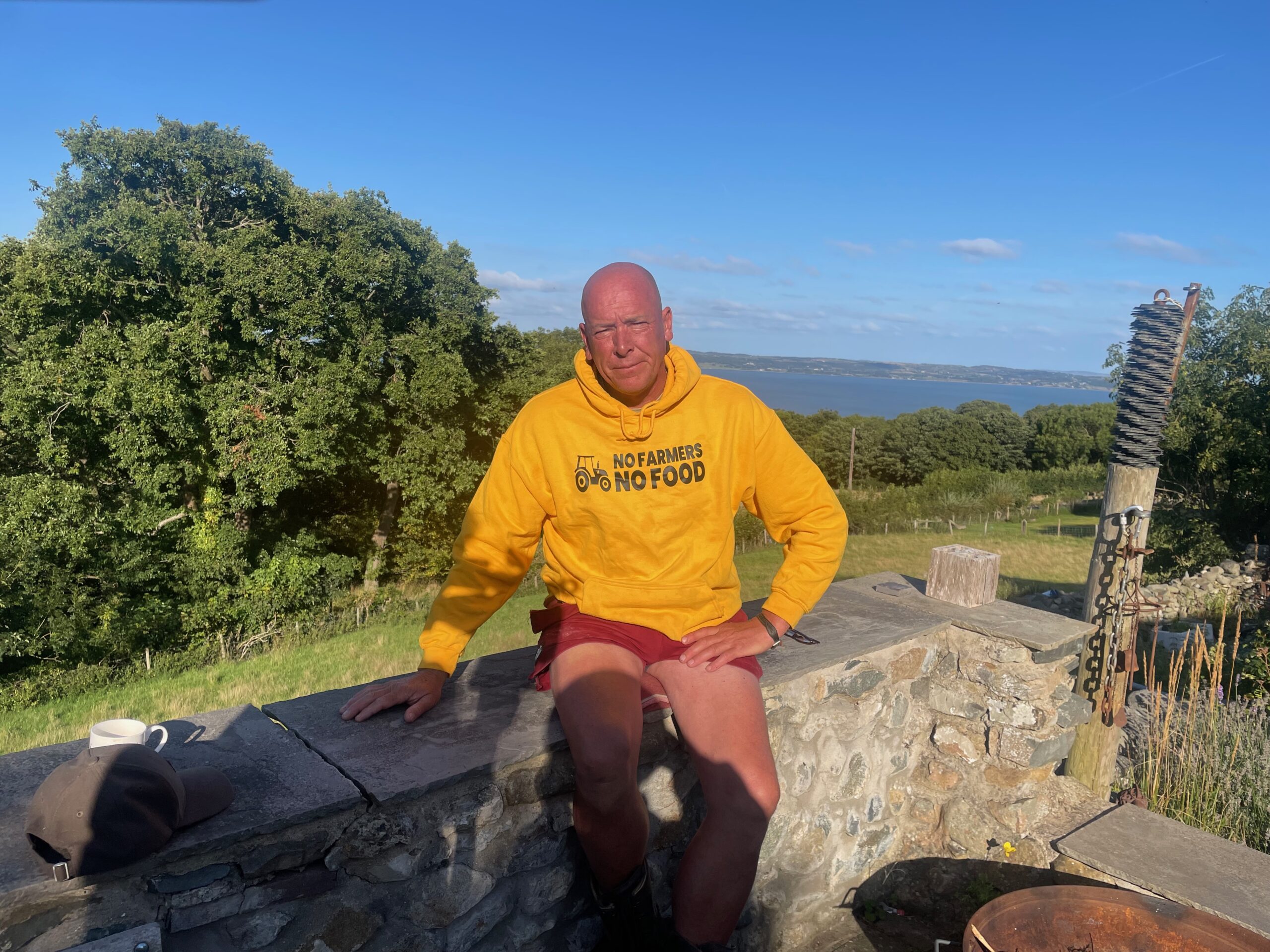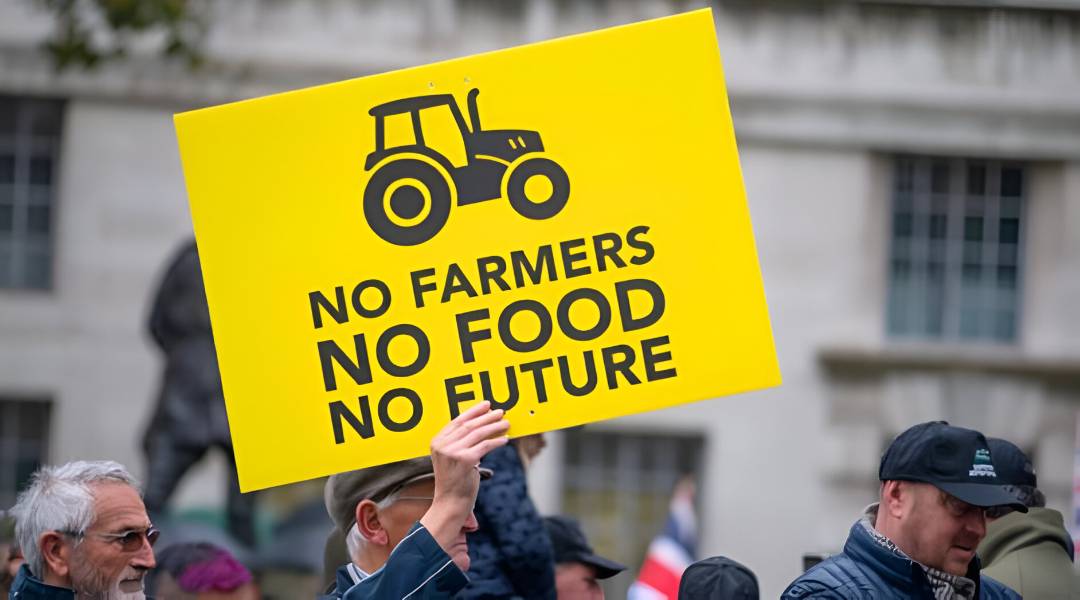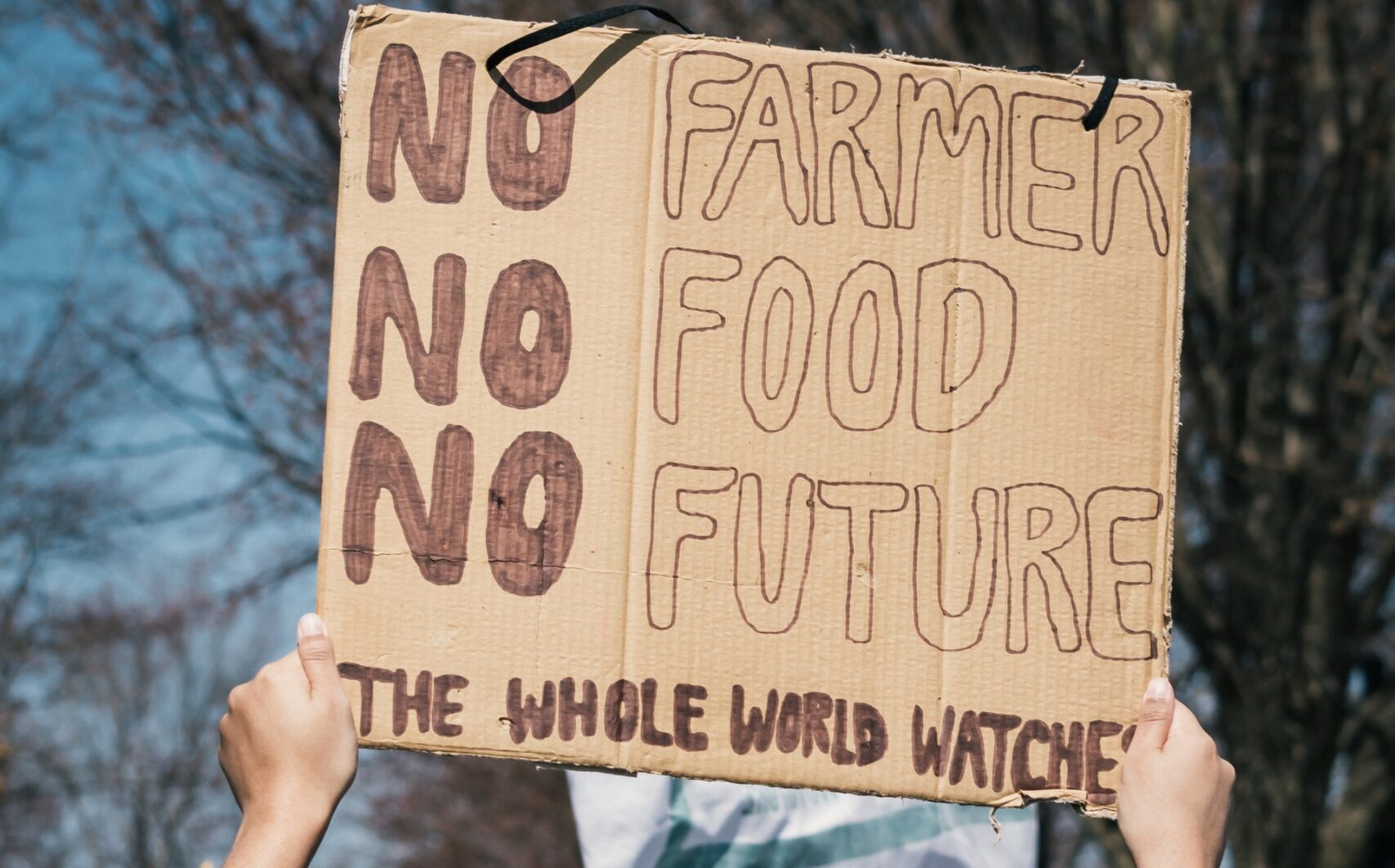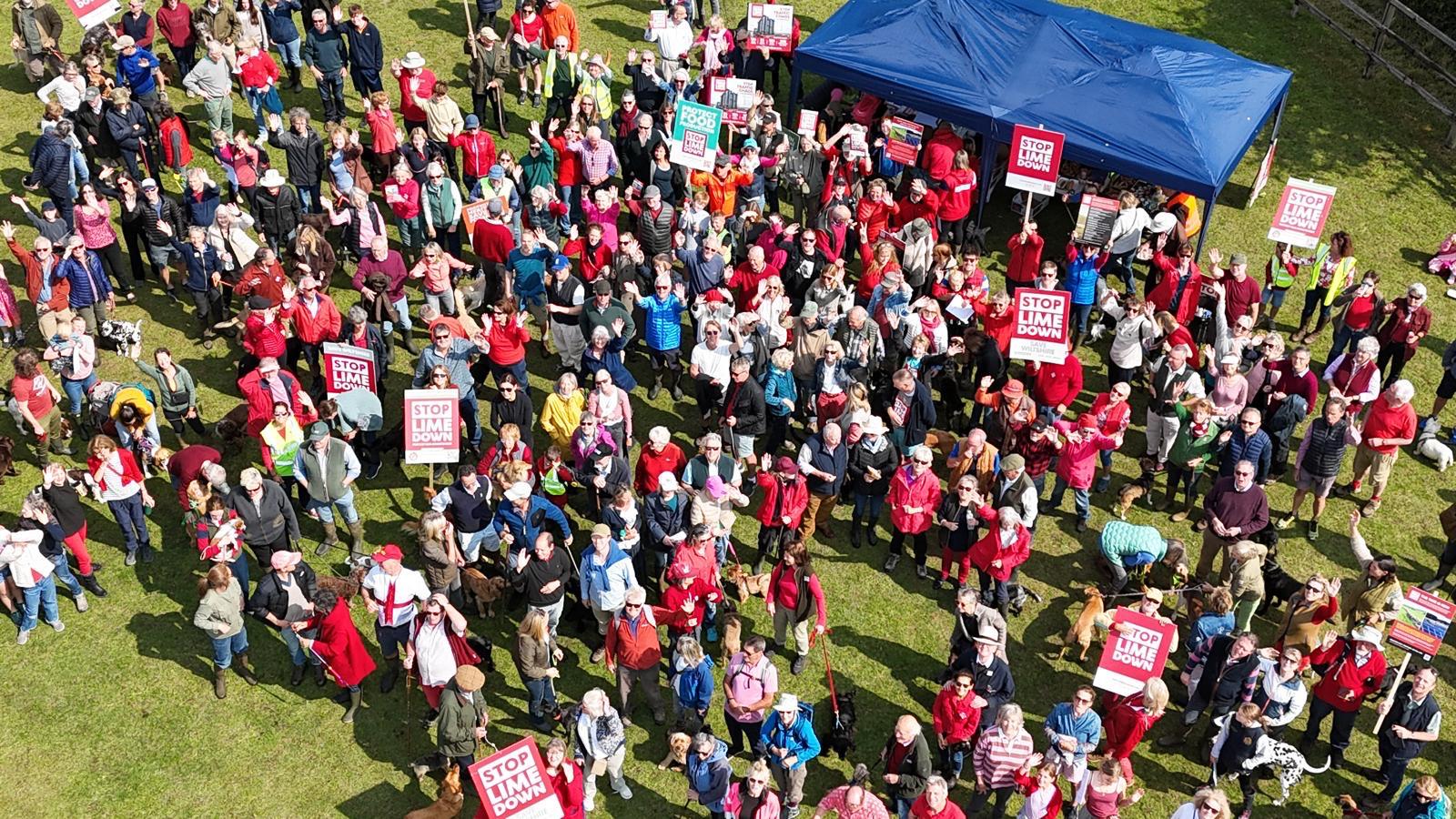Pester Pig says #JustAsk!
If you love the outdoors and also enjoy the occasional bacon sarnie, make sure to #JustAsk if the pork is from a local high welfare farm. Pigs are happier and healthier when reared outdoors and not confined in cruel factory farms. Please watch, like and share this wacky video to help this message reach a wider audience.
Corporate capture
When we filmed Pig Business in Canada with Roger Harley, he was one of Canada’s last remaining farmers raising outdoor pigs. So popular was his pork that when factory pig farmers visited, many lamented having taken out massive loans to industrialise their production system as they made no money and their pigs led miserable lives compared to the pigs roaming in Roger’s fields.
The corporate PR machine is so effective at promoting industrial farming as the most efficient way to feed the world, that governments are subsidising industrial farmers to consolidate into giant monopolies flooding every market with cheap unhealthy food and hoovering profits that once went to support local economies. Meanwhile, consumers are increasingly turning away from the cruelty and environmental destruction of industrial farming by turning vegan and vegetarian. So again the corporate PR machine, detecting new markets to dominate, has persuaded governments and investors to pour billions into developing lab-grown meat. This Guardian article is very persuasive as to why, in the immediate, we must accept lab-grown meat if only because it provides an alternative to the global disaster of factory farming with its deforestation, pollution, antibiotic abuse and cruelty.
‘Americans will eat about 2bn chicken nuggets this year, give or take a few hundred million. This deep-fried staple is a way of profiting off the bits that are left after the breast, legs and wings are lopped off the 9 billion or so factory-farmed chickens slaughtered in the US every year. Like much else that is ubiquitous in contemporary life, the production of nuggets is controlled by a small group of massive companies that are responsible for a litany of social and ecological harms. And, like many of the commodities produced by this system, they are of dubious quality, cheap, appealing and easy to consume. Nuggets are not even primarily meat, but mostly fat and assorted viscera – including epithelium, bone, nerve and connective tissue – made palatable through ultra-processing. As the political economists Raj Patel and Jason Moore have argued, they are a homogenised, bite-size avatar of how capitalism extracts as much value as possible from human and nonhuman life and labour.
But if chicken nuggets are emblematic of modern capitalism, then they are ripe for disruption. Perhaps their most promising challenger is a radically different sort of meat: edible tissue grown in vitro from animal stem cells, a process called cellular agriculture. The sales pitch for the technology is classic Silicon Valley: unseat an obsolete technology – in this case, animals – and do well by doing good.
There are plenty of smart, progressive critiques of this system, but most of the suggested alternatives involve breaking up the food giants and downsizing or diversifying US farms. But antitrust policy alone won’t address the harms done to animals, labour or the environment by modern animal agriculture. Breaking up big operations could simply generate more, if maybe slightly smaller and slower factory farms. As for genuinely small farms engaged in more holistic agriculture, the theory is that they are more environmentally sustainable, protect jobs and keep local stores stocked with juicy heirloom tomatoes and humanely raised beef. But building an agricultural system around small farmers that is economically viable and can benefit most of the population could be a tall order. Many people don’t want, can’t afford or don’t have access to organic, free-range, farm-to-fork meat and produce. What they can get are nuggets. And proponents of going small often struggle to explain how their ideas can be done on a big enough scale and at a low enough price to challenge the status quo, and in a timeframe that responds to our ongoing ecological crisis.
Meanwhile, experts on the environmental impacts of the food system mostly concur that we need to eat much less meat. Some propose vegetarian and vegan diets as solutions. And even meat-inclusive proposals, like the EAT-Lancet commission’s model diet, recommend steep reductions, especially in the global north, and suggest a move away from the factory farming model of meat production. However, there are no signs that anything except outright bans on factory-farmed meat can achieve the required cuts – and that, for now, is a political non-starter.
This is where cellular agriculture comes in. The thing that could help solve the chickenisation of our food system is not pasture-raised hens, but mass-produced chickenless nuggets.’
The power of our purse
As neither the left or the right wing parties in the UK want to challenge corporate power, the above article is probably right. However, if you, like me, want to resist the road to adulterated food, we must keep informing the public of the urgent need to buy healthy meat from real farmers. We must pay more for it but spread the cost by eating less but better meat and, in the process, save money on doctors’ bills from poor health and prevent potential zoonotic diseases such as Covid-19 and Swine Flu, along with ensuring that animals are not tortured, workers are not treated like machines and farmers are paid a fair price.
In this one minute film – CEO of Sustainable Food Trust Patrick Holden makes the distinction between eating pasture fed animals compared to factory farmed.
“Sustanably managed livestock will play a central role in rebuilding the soil fertility that we’ve lost so we need to eat those livestock products that come from those regeneratively managed animals and we need to give up those ones that come from the intensive side and the key is the difference between the two. What we need now is a nation of well informed consumers who know the difference between the unsustainable plants and animals which are part of the problem and the sustainable animal system and products which are part of the solution.”
Senseless trade
If the true cost of meat that had criss-crossed the globe was internalised into the price, locally produced, pasture-fed meat would be cheaper. There is a growing awareness that the global food trade is environmentally, economically and socially senseless.
Trade-related transportation is one of the fastest growing sources of greenhouse gas emissions and is therefore significant in terms of climate change. Although most food is distributed by road and ship, the airfreight of foodstuffs is increasing. For example, UK imports of fish products and fruit and vegetables by plane between 1980 and 1990 increased by 240% and 90%, respectively.
The sheer absurdity of this food swap is seen by the fact that Britain imported 240,000 tonnes of pork and 125,000 tonnes of lamb while at the same time exporting 195,000 tonnes of pork and 102,000 tonnes of lamb. Even more bizarrely we imported 61,400 tonnes of poultry meat from the Netherlands in the same year that we exported 33,100 tonnes of poultry meat to the Netherlands.
Poor farming stranglehold
In this 4 minute BBC interview, a UK pig farmer speaks about how much she would prefer to raise her pigs outside but has been forced to use the indoor slatted floor system, which means illegally depriving the pigs of straw, because it is the only way to make the farm financially viable. Giving pigs straw means they use more energy and so put on weight more slowly, she explains, plus she would have to pay the labour cost of cleaning out the sheds and renewing the straw.
Beware of outright bans
While cheap imports continue to undercut farmers, banning barren, fully slatted floors, gestation crates (still legal in the EU for a month in each pregnancy) and farrowing cages, where the sow can’t turn around for up to five weeks while suckling her piglets, will exacerbate their demise. A pig housing company has warned how much more it will cost the farmers to have a more open farrowing system.
“Most farmers I deal with are in favour of the higher welfare pens but there should be proper recognition of the eye-watering costs,” Mr Miller added.
“When sow stalls were unilaterally banned in 1999, the UK industry virtually halved in size.
“Production of pork and bacon was simply exported to the continent where it was produced under the same systems that were banned here,” he said.
Hero of UK food condemns trade deals
In this interview, Belinda Gordon, strategy director at Green Alliance, spoke to Henry Dimbleby, founder of the Leon restaurant chain and leader on the National Food Strategy, who (6m 10s in) explains how his recommendations will become redundant if the government signs free trade treaties that allow substandard meat flood our markets.
“On the environment side, before you think about health, you are trying to perform a feat of acrobatics in balancing off the various outcomes you are looking for from the ecosystem; you want to increase biodiversity, you want to want to get to ‘net negative’ by sequestering carbon in the land that is currently used for farming, you want to reduce antimicrobial resistance and protect against zoonotic diseases. Those things dont easily fit in one solution so you have to balance them. If you conduct this huge balancing act within our borders, and then you strike a trade deal that doesn’t place those constraints on foreign producers of food, you could simply export those problems. Eg if you import cheap beef from Brazil, you export your carbon sequestration from here to there. So you seem to be reducing your carbon footprint here but you are probably doubling it and simultaneously destroying the livelihoods of your farmers. So trade is like an escape valve so you can create a certain system in this country but if you dont put the same standards on trade on food you import you just export those harms – whether it is animal welfare, carbon, antibiotic resistance, zoonotic diseases to another country so it is pointless.”
“There’s a fundamental problem at the heart of the Tory party on what Brexit meant. So there is a group of Brexiteers who think that it was about the ability to set our own standards and to do what we wanted to do and who bulked against having standards set by Brussels. And there is a group that seems to have pounced on it and said that it’s all about free markets, free trading and free wheeling. If you talk to people across the country as we did, particularly those in the Red Wall areas in the North East, those people that made Brexit possible, they made it really clear that they do not want a 2 tier system. They want to maintain our standards and do not want a system where if you have enough money to shop at Waitrose you get one sort of food and everywhere else another kind of food. How that plays out over the next 6 months; Australia, we dont know yet what’s in the Australia deal but in terms of the amount of harm that can be done, it is relatively small. But Brazil and the US are a big big deal and if we do trade deals with them we are in all sorts of trouble.”
“…the government needs to set out what it means by the core standards to protect and they haven’t done that yet. The Trade and Agriculture Commission and I recommend using the tariff approach.”
Solutions to insanity
With a government blinded by its neoliberal ideology, as consumers and citizens we have to take back control and support farmers in their efforts to feed us sustainably. Though I have yet to see this practiced in the UK, an inspiring solution is mob grazing pigs;
“Pigs are like the ultimate tractor, except they fertilise the soil while loosening it and don’t have any breakable parts, nor cause compaction. My definition of a pig is that it is a tractor that you eat when it has finished working.”
McIntosh bases his farming system on the high density grazing methodology or ‘mob-grazing’ utilising the manure and urine that is deposited onto the soil by the animals to eliminate the need to apply any artificial NPK fertilisers.
The pastures were established with a variety of different perennial summer and winter legumes, herbs and grasses. Once an area has been grazed, the animals are moved, giving the pasture and soil time to regenerate and fully recover. A minimum of six weeks passes before the pastures are grazed again.
News update
? Chickens, pigs and fish fed on leftovers could help tackle climate change.
‘Living Well on Leftovers makes a case for eating meat from animals fed only on surplus or to-be-wasted food via two case studies; feeding leftovers to farmed fish, and to pigs and chickens. The report emphasises the need for proper regulation to make surplus feed safe, fair and effective’.
? JBS to pay $20 million in latest pork price-fixing case.
The class-action lawsuit alleged that the company violated federal and state consumer and antitrust laws when conspiring to fix prices for pork.
? BBC’s Farming today (8 minutes in), explains how farms smaller than 5 acres won’t be eligible for the ELMs subsidies that pay farmers public money for public goods because the payment is based on the past EU basic payment scheme that excluded them. Joyti Fernandez, from The Landworkers Alliance explains why the government should stick to their promise to change this;
“There are 16,325 commercial farms under 5 acres. Small farms deliver a huge amount of public goods including biodiversity benefits because many are mixed farms, many are organic or chemical free.”
? DEFRA Consultation: Delinking and Lump sum as described by the Landworkers Alliance
These two schemes are intended to replace Direct Payments, and to support farmers if and when they decide to leave the farming sector. These payments may come with conditions such as selling or renting the land, which could provide opportunities for new entrants as well as land-based social enterprises. These schemes should therefore link with the Government’s New Entrants Support Scheme to create co-benefits and positive outcomes. However, without robust criteria and mechanisms, any land made newly available through these schemes could be consolidated by existing large landowners and/or subject to poor farming or land management practice.
Please donate
Forgive me for pointing out that, while we receive some one-off donations, I am funding Farms Not Factories myself, and if we are to continue to fight the cruel, antibiotic-led factory farm system, we will need some regular donations from like-minded people. Please consider a monthly subscription of £2/month and help us support a network of smaller scale, humane and healthy UK pig farms, local abattoirs and butchers.
“Our message is simple, we want to help bring an end to this dangerous, inhumane system. Vote for real farming over factory farming.”
– Tracy Worcester, Director
Contents
Share This Article
Related ArticlesView All
Protect UK Farmers from Low Standard Imports
The purpose of our newsletter is to give you important information that is censored in the mainstream media. “The way… Read More
Protectionism vs So-Called Free Trade
The purpose of our newsletter is to give you important information that is censored in the mainstream media. “The way… Read More
Find A Farmer
The purpose of our newsletter is to give you important information that is censored in the mainstream media. “The way… Read More
Zionist Money Rules
The purpose of our newsletter is to give you important information that is censored in the mainstream media. “The way… Read More
The Price of Progress
The purpose of my newsletter is to give you important information that is censored in the mainstream media. “The way… Read More
Silencing Dissent Through Fear
The purpose of my newsletter is to give you important information that is censored in the mainstream media. If you… Read More

